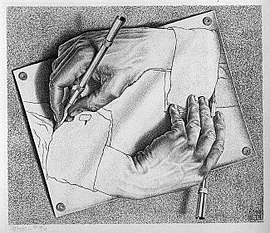Douglas Hofstadter's Godelian Philosophy of Mind
A philosophy paper that critiques Hofstadter's arguments in his books Godel, Escher, Bach and I Am a Strange Loop. The paper has a few somewhat technical parts - mostly dealing with Godel's theorems, but these can be skimmed over without losing the gist of the paper's argument.
Note: If the link only takes you to the abstract, click on the PDF/EPUB link and it will take you to the full paper.
An excerpt:
 1. Godel's Theorem and The Brain: Introduction
1. Godel's Theorem and The Brain: Introduction
Philosophical literature brims with proposals which make use of Godel's Incomple-teness Theorems in order to reject computational accounts of human minds (e.g. Nagel and Newman [1958], Lucas [1961], Penrose [1989]). One may rightfully get the impression that the very same theorems cannot possibly be used for philosophically opposed purposes, e.g. to philosophically illuminate computational perspectives on the mental. That being said, such "positive" Godelian theses exist, but for some mysterious reason, they have generated virtually no engagement in the academic discourse. This paper aims to make some steps toward filling this literature gap by focusing on a specific positive proposal: that of Hofstadter[1979,2007].
In his tomes, Hofstadter offers an elaborate thesis about how inanimate com-ponents (such as individual neurons) can collaborate to yield a conscious mind with causal powers. Our aim in this paper is to look at just a handful of aspects of his larger project, such as his explanation of why it is perfectly meaningful to talk of human minds as being causal loci, whilst still acknowledging the deterministic nature of the low-level neural computation which takes place in human brains. Hofstadter main-tains that his insights are best observed through parallels with the Godelian Incompleteness Phenomenon in Metamathematics.
The task we set for ourselves in these pages is to take a closer look at these parallels and to see what lessons can we actually derive from them. Originally, Hofstadter's magnum opus, "Godel, Escher, Bach" (GEB) was planned to be a much shorter piece, suggestively entitled "Godel's Theorem and The Brain". To see what The Incompleteness Theorems supposedly have to do with brains (and with questions of causality), we will answer within this paper the following questions:
(1) What does Hofstadter mean by a Strange Loop (or a Tangled Hierarchy)?
(2) Why does Hofstadter invite us to view the brain from various hierarchical vantage points (e.g. the microphysical level, the neural level, the symbolic level, the level of the mind)?
(3) How does causality interplay between these hierarchical levels? Is the hierarchy a tangled one?
(4) What quintessential Strange Loop does Hofstadter think Godel's work contains?
(5) How, why and in what way could that particular Strange Loop illuminate theway in which we understand minds?
more ...
